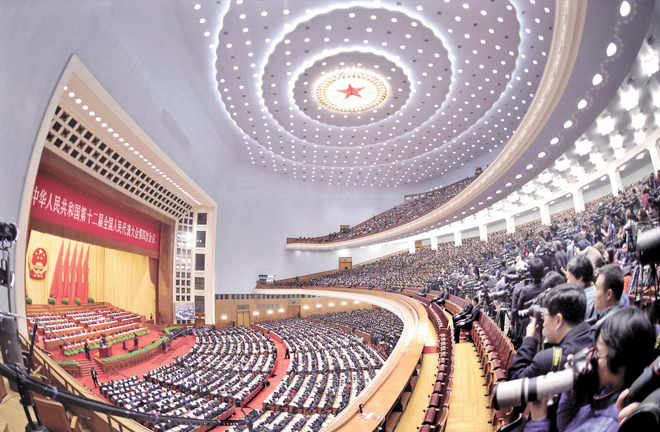People’s congresses crucial to development

The fourth session of the 12th National People’s Congress opens at the Great Hall of the People in Beijing on March 5, during which Chinese Premier Li Keqiang delivered a government work report.
This year marks the beginning of the 13th Five-Year Plan and a crucial period for building a “moderately prosperous society.” The ongoing National People’s Congress (NPC), China’s top legislative body and the Chinese People's Political Consultative Conference (CPPCC), the country's top national advisory body, are drawing worldwide attention.
The people's congress system is now displaying unique advantages and is a great contribution to the history of political systems.
The system of people's congresses is the basic political system of China and the organizational form of state power. It is a choice which emerged from history and the people. The system reflects the efforts of the Communist Party of China to realize the concept of people’s democracy and improve the socialist political system. Moreover, the system represents the practical application of the Marxist theory of state power to Chinese realities.
The people's congress system has unique advantages. Above all, it ensures that people have a right to broad democracy. It upholds the notion that all power of the state belongs to the people, serving as the fundamental means through which the people exercise state power and functioning as a legal institution that guarantees the people's rights as the masters of the country.
State power comes from the people, who have the right to elect, supervise and recall civil servants. Representatives to the people's congresses at all levels are elected democratically.
In addition, the system reflects the national situation of China, a country with a large population. The system provides an alternative to direct democracy, which is made impossible by the huge population. Ordinary people elect deputies who constitute a people’s congress at the basic level. Then the basic-level deputies elect deputies who constitute a people’s congress at a higher level, and so forth. Eventually, the National People’s Congress, the highest organ of state power, is established.
The representative system ensures the interests of the majority as well as the minority. Since deputies come from all walks of life, all places and ethnic groups can be represented. Through the system, voices of all circles can be heard, thus reflecting the interests and needs of the people.
Moreover, the system is conducive to the concentration and unification of political power, which gives rise to efficiency. The power structure under this system is different from the separation of legislative, executive and judicial powers in Western countries, and the combination of legislative and executive powers in the former Soviet Union. People’s congresses are not just legislative bodies. They can also exercise state power based on democratic centralism. State administrative, judicial and procuratorial organs are created by and responsible to the people’s congresses. This relationship strengthens coordination among them and maintains efficiency in fulfilling tasks.
Also, there is a division between rights and liabilities. The government, courts and procuratorates all perform separate functions while exercising decision-making power, enforcement power and supervision power, respectively. The unification and division promote the coordination among state organs and greatly enhance their efficiency, which plays a significant role in driving national construction and rapid growth of China as a developing country.
Dubbed the two sessions, the NPC and the CPPCC, which convene in spring every year, are a significant part of the people’s congress system and are closely related to economic and social development in the nation. During the sessions, NPC deputies hear and deliberate the government work report, and examine reports on national planning, budget and other topics.
NPC deputies and CPPCC members make constructive proposals that reflect the needs of the people and the society. All previous NPC meetings and related bodies have focused on the formulation of laws, regulations and policies key to national and social development. For instance, at the end of last year, the NPC’s Standing Committee passed the amended Population and Family Planning Law to allow couples to have a second child.
In recent years, China has been encountering various problems in its development, such as slower economic growth, environmental pollution and official corruption. This requires the potential of the people’s congress system to be further realized to deal with these problems.
The 13th Five-Year Plan, the “Belt and Road,” and “Green Development” will be the hot topics for the two sessions this year. The strong vitality and unique advantages of the people’s congress system ensure the smooth introduction of key policies, laying a solid foundation for realizing the Chinese dream of great national rejuvenation.
Jin Xiaoxia is from the School of Marxism at Hohai University in Nanjing, Jiangsu Province.

 PRINT
PRINT CLOSE
CLOSE